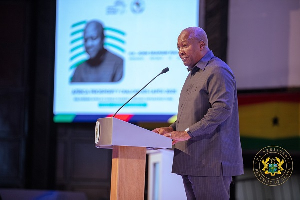Parliament has approved a syndicated loan facility of US$300million to enable the Ghana Cocoa Board (Cocobod) to pay off debts owed local investors.
The 275-member legislature on Wednesday also approved a request for an interim Stamp Duty waiver of US$3million on the syndicated facility to refinance domestic bills.
Cocobod, which currently owes investors in excess of GH¢1.35billion, is confident the loan facility will help it cut the high interest payments on domestic debts.
The Deputy Minister of Finance, Ato Forson, and the Chief Executive Officer of Cocobod, Dr. Stephen Opuni who made the case to the Parliamentary Select Committee on Finance for the loan facility to be approved, said while it is currently paying an annual interest rate of 29 percent on its debts to local investors, the new facility attracts a rate of 3.48 percent per annum, which makes it prudent to use the syndicated facility to refinance the local debts.
Mr. Ato Forson is convinced the arrangement will help Ghana Cocoa Board to “make significant savings”, since the annual cost of the medium term loan facility is estimated at GH¢39million; which is below the cost of GH¢345million paid on the local facility.
However, some legislative members argued the increasing cost of servicing domestic debt was necessitated by failure of the Cocobod to pay off the debt when it fell due.
Cocobod chief Dr. Opuni explained that in the 2012/2013 and 2013/2014 crop season, the Board in collaboration with the Bank of Ghana issued a 182-day bill to finance cocoa purchases. However, as a result of low cocoa prices which averaged US$2,130 and US$2,300 on the world market within the period, the Board was unable to pay the investors that had bought its securities -- forcing it to roll-over the facility.
But as a result of high interest payments on the bill, the Board of Directors of Cocobod gave approval for the firm to take a medium-term facility of US$300million to refinance the principal and interest on the 182-day bill, which currently amounts to GH¢1.35billion.
A report of the Finance Committee of Parliament noted that high interest payments have adversely affected Cocobod finances, “making it necessary to refinance the bills with proceeds from the medium-term facility, which will improve the cash flows, liquidity and the viability of COCOBOD and reduce high interest payment on bills”.
Government believes the syndicated loan facility with the seven banks, which has a three-year repayment period and a one-year grace period, will give Cocobod a respite in the face of the country’s liquidity challenges.
This year, Cocobod has sold more than US$500million of local bills to finance its operations, which include purchasing the beans from farmers in the world’s second-largest producer of the crop. The regulator has been selling more of the securities than expected since at least the 2012-2013 season.
Business News of Friday, 18 December 2015
Source: B&FT
Cocobod secures US$300 million to retire debt
News

Abundant evidence confirms lithovit's effectiveness: AG justifies withdrawal of Opuni-Agongo case
Sports














